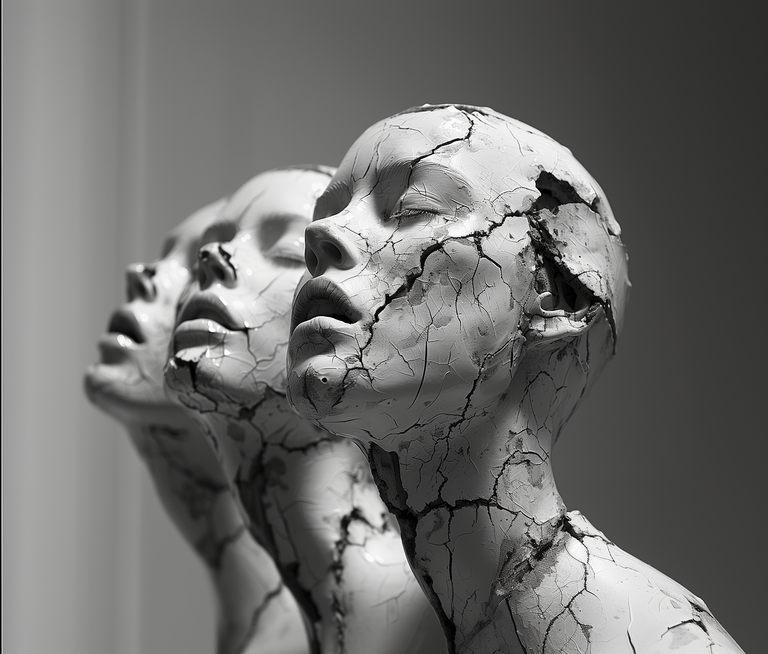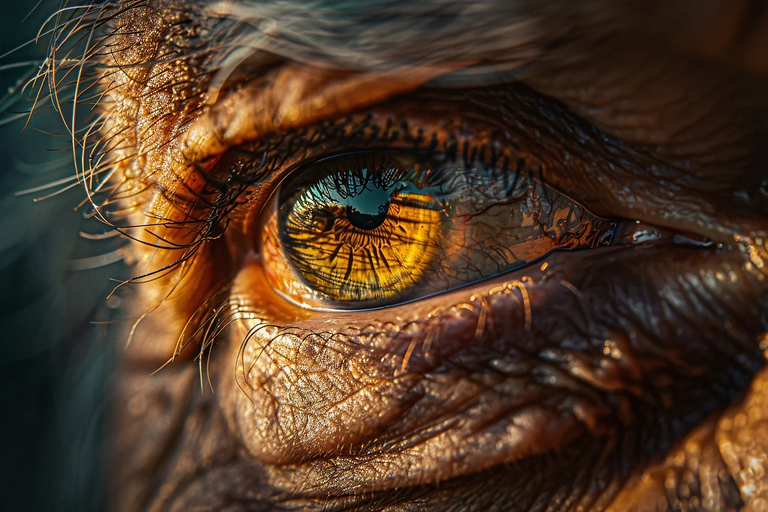Creative Nonfiction: Shipwrecked on the same island/ Náufragos en una misma isla

Shipwrecked on the same island

As I was on the 4th floor, I quickly went down to the first floor where I had to ask for an order. I had already been told that I had to get up early if I wanted to get a slot because the radiologist went to the hospital twice a week and only saw 15 people a day. When I arrived I saw a line of people in front of the office door and I mentally counted: one, two, three, nine, eleven, fourteen... there were 14 people, with me there were already 15 people. I breathed a sigh of relief: I had arrived on time.
I got in line and the lady in front of me barely turned to look at me as when you feel that someone is behind you. I tried to put a smile on my face, but the woman couldn't see it: her eyes were tired as if she hadn't slept for a thousand years. I nervously checked the time on my watch again and it was 5 o'clock. I thought that when I got back to the hospital room, I would fix the watch and set it to the exact time because it should already be, according to the clock on my cell phone, 6 o'clock in the morning.

"I was in the queue. I was number 15," she said rudely, and pushed me out of the queue.
"No, ma'am, when I arrived there were 14 people. I am the last one," I said trying to be firm.
"Of course not," insisted the woman in the long skirt, "I got here before you, but I came up here to get the recipe," she shouted and tried to get in front of me. I resisted and spoke in a loud voice:
"No one told me that you were the last in line. If you were going to get on, you should have told the last in line," the woman who had turned to look at me before and everyone else who was waiting, turned their faces towards us:
"That lady was not there. The girl got there first," said a man with a haggard face and dirty clothes.
"Yes, the girl is number 15," ratified a woman who didn't look well either.
"Maybe you didn't see me, but I arrived a while ago and then I had to go upstairs to get this," insisted the woman in the long skirt, showing the paper she was holding.
"Well, I don't know what you will do, but I am number 15," I said definitively, crossing my arms.
"I'm not going to move from here either, because I know I got here first," said the woman, and for the first time I noticed her eyes: they looked like a sad landscape.

Instinctively I looked at the clock on my cell phone and it was 7 o'clock in the morning. Soon the doctor and the secretary would arrive. I leaned my head back, leaned it against the wall and closed my eyes. Suddenly, the lady in the long skirt got a call and gave a loud shriek:
"Nooooo. Nooooo,nooooo" she screamed and began to cry. All of us present exchanged glances without knowing what to do: we looked like fish out of water. The daughter of the woman in the long skirt had died of a heart attack. We all tried to comfort her, to give her help, but the woman ran away with her hands on her head.
We had not recovered from that news, when a nurse came out and notified us that the radiologist could not come to the hospital that day and that we had to return the next day. People, with the little strength they had, began to protest, but the nurse left as if we were invisible. I looked at the paper in my hand which clearly read urgent. Then I looked at my wristwatch and realized that the hand had stopped at 5 o'clock. I looked at the long corridor of the hospital, the long lines of people waiting and prayed that none of those waiting would be late.

All images are free of charge and the text is my own, translated in Deepl


Thank you for reading and commenting. Until a future reading, friends
![Click here to read in spanish]
Náufragos en una misma isla
En mi reloj de muñeca eran las 4 de la madrugada, pero en el reloj del celular eran las 5. Ante la diferencia de horario, consulté con mi hermana que estaba en la cama del hospital y efectivamente, mi reloj se había atrasado. Como pude, me eché un poco de agua en la cara, me lavé los dientes y tomé el récipe médico donde estaba anotado que mi hermana debía hacerse una radiografía con urgencia.
Como estaba en el piso 4, bajé rápidamente a planta baja donde debía pedir una orden. Ya me habían dicho que debía madrugar si quería obtener un cupo porque el radiólogo iba dos veces a la semana al hospital y solo veía a 15 personas por día. Al llegar vi una cola de personas frente a la puerta del consultorio y mentalmente conté: uno, dos, tres, nueve, once, catorce… estaban 14 personas, conmigo estaban ya las 15 personas. Respiré aliviada: había llegado a tiempo.
Me acomodé en la fila y la señora que estaba delante de mí, apenas volteó a verme como cuando sientes que alguien se ha puesto detrás de ti. Yo intenté dibujar una sonrisa en mi rostro, pero la mujer no alcanzó a verla: tenía los ojos cansados como si llevara mil años sin dormir. De manera nerviosa revisé nuevamente la hora en mi reloj y eran las 5. Pensé que cuando volviera a la habitación del hospital, arreglaría el reloj y le pondría la hora exacta porque ya debían ser, según el reloj del celular, las 6 de la mañana.
De mi boca se escapaba un bostezo, cuando llegó una señora que vestía una falda larga con un papel arrugado en la mano, como si viniera de otra parte:
_Yo estaba en la cola. Yo era el número 15 –dijo de forma grosera y me empujó fuera de la cola.
_No, señora, cuando yo llegué había 14 personas. Yo soy la última –expresé intentando ser firme.
_Claro que no –insistió la mujer de la falda larga- Yo llegué aquí primero que tú, pero subí a buscar el récipe –gritó e intentó acomodarse delante de mí. Yo puse resistencia y hablé en voz alta:
_A mí nadie me dijo que usted era la última de la cola. Si usted iba a subir debió informarle al último de la fila –en eso la mujer que antes había volteado a verme y todos los que estaban esperando, giraron su rostro hacia nosotras:
_Esa señora no estaba ahí. La muchacha llegó primero –afirmó un señor de rostro demacrado y ropa sucia.
_Sí. La muchacha es la número 15 –ratificó una mujer que tampoco tenía buen aspecto.
_Será que ustedes no me vieron, pero yo llegué hace rato y luego debí subir a buscar esto –insistió la mujer de la falda larga enseñando el papel que tenía en las manos.
_Bueno, no sé lo que usted hará, pero yo soy la número 15 –expresé de manera definitiva cruzándome de brazos.
_Yo tampoco me voy a mover de aquí, porque yo sé que llegué primero que tú –sentenció la mujer y por primera vez detallé sus ojos: parecían un paisaje triste.
Sin más nada que decir, todos volvieron a sus pensamientos. Yo me pegué contra la pared para poder sostenerme. Me sentía cansada y desesperada: mi hermana tenía una semana en el hospital y todavía no la habían operado. Por la apariencia de los que estábamos allí, todos estábamos sufriendo lo mismo: la dilatación, la ansiedad, la desesperanza y aquella forma cruel de posponer las cosas. El hospital público de mi ciudad era una isla abandonada en mitad de la nada en donde solo unos pocos lograban salvarse.
Instintivamente miré el reloj del celular y eran las 7 de la mañana. Pronto llegaría el médico y la secretaria. Eché la cabeza hacia atrás, la apoyé en la pared y cerré los ojos. De repente, la señora de la falda larga recibió una llamada y dio un alarido fuerte:
_Noooo. Nooooo –gritaba y comenzó a llorar. Todos los presentes intercambiamos miradas sin saber qué hacer: parecíamos peces fuera del agua. La hija de la mujer de la falda larga había muerto de un infarto. Todos intentamos reconfortarla, darle ayuda, pero la mujer salió corriendo con las manos puestas en la cabeza.
No nos habíamos repuesto de aquella noticia, cuando una enfermera salió y notificó que el radiólogo no podía asistir al hospital aquel día y que debíamos volver al día siguiente. La gente, con la poca fuerza que tenía comenzó a protestar, pero la enfermera se fue como si fuéramos invisibles. Yo miré el papel que tenía en la mano donde claramente se leía la palabra urgente. Después miré el reloj de pulsera y me di cuenta que la manecilla se había detenido en las 5. Miré el largo pasillo del hospital, las largas filas de gente esperando y rogué para que a ninguno de los que esperaban se les hiciera tarde.
Happy, grateful and proud of your recognition, friends. Thank you, thank you very much
Being admitted to a public hospital is indeed an ordeal because you literally don't have a choice but to wait for hours just to be accommodated. Hospitals were often the places where sad endings happened, and I just hope that the lady can cope with the loss of her daughter...
I share this idea with you. I think hospitals can steal our souls. Regards
Your experience reflects very well everything that sick people have to go through in these precarious health systems that governments forget. Each case is a drama, often with fatal outcomes.
Thanks for sharing your experience with us.
Excellent day.
Sometimes we think that only a few of us have experienced this odyssey, but no. There are many who have suffered the wait in public hospitals. A good day for you
From Venezuela, our witness drives decentralization and the adoption of Web3 technology, creating opportunities for the local community and contributing to the global ecosystem. // Desde Venezuela, nuestro testigo impulsa la descentralización y la adopción de la tecnología Web3, generando oportunidades para la comunidad local y contribuyendo al ecosistema global.
Sigue, contacta y se parte del testigo en: // Follow, contact and be part of the witness in:
Happy and grateful for your support, friends!!! Greetings and continued success
the atmosphere of this peice is stunning. you put us in that liminal world of hospital waiting where time seems to operate along different rules than the normal world.
the whole thing reads as other-worldly and could easily have been presented as fiction, that it is from experience adds depth to the frustration and tragedy within
This metaphor between the broken clock and real time is sad, but true. In tragedy, time acquires a strange speed. When we expect dawn to break soon, the hours pass in slow motion and vice versa. Greetings and thanks for your comment.
It's unfortunate that the woman's daughter died. That is never easy to bear.
After all of your arguments and time waiting there, the radiologist eventually did not show up. That's terrible
Great battles are fought in hospitals: sometimes we lose, sometimes we win, but we always come out with wounds. Scars that remind us of where we were. Greetings
¡Felicitaciones!
Estás participando para optar a la mención especial que se efectuará el domingo 7 de julio del 2024 a las 8:00 pm (hora de Venezuela), gracias a la cual el autor del artículo seleccionado recibirá la cantidad de 1 HIVE transferida a su cuenta.
¡También has recibido 1 ENTROKEN! El token del PROYECTO ENTROPÍA impulsado por la plataforma Steem-Engine.
1. Invierte en el PROYECTO ENTROPÍA y recibe ganancias semanalmente. Entra aquí para más información.
2. Contáctanos en Discord: https://discord.gg/hkCjFeb
3. Suscríbete a nuestra COMUNIDAD y apoya al trail de @Entropia y así podrás ganar recompensas de curación de forma automática. Entra aquí para más información sobre nuestro trail.
4. Visita nuestro canal de Youtube.
Atentamente
El equipo de curación del PROYECTO ENTROPÍA
It can always happen that way most especially in the public places where you have to wait for several hours before your turn and sometimes, it may not even get to you o. Time despite being early.
This is a very tragic story, and it is well told thanks to your attention to detail.
These details make the world come alive and one feels pull into the emotion of the narrative. It was a great read and nicely crafted.
This piece vividly express the regular experience in government hospitals in my country. If it were in Nigeria, you may find out that the radiologist has a private hospital that he is operating in at the expense of the government's.